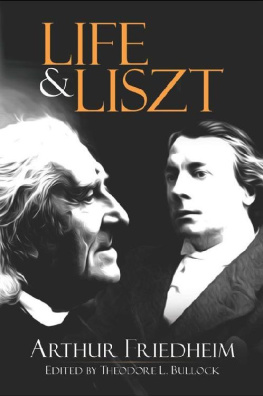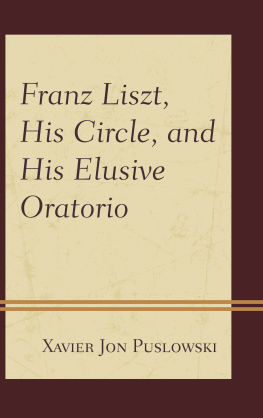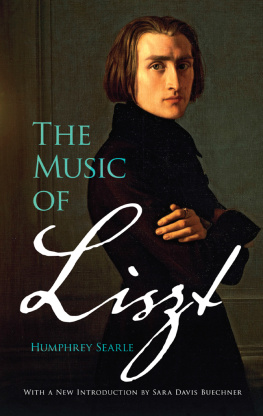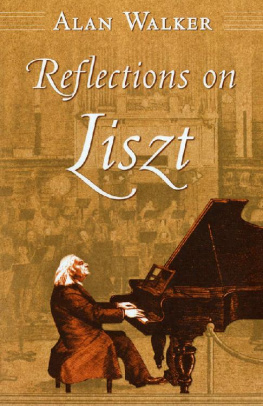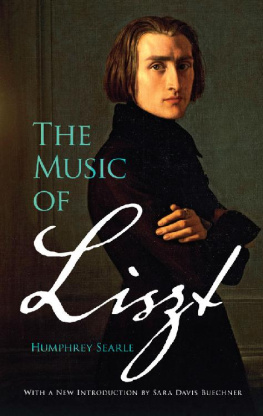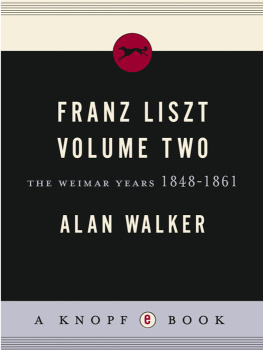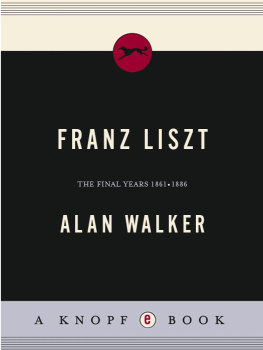L IFE AND L ISZT
The Recollections of a Concert Pianist
Arthur Friedheim

Edited by
Theodore L. Bullock

Dover Publications, Inc.
Mineola, New York
Copyright
Copyright 1961 by E. A. Friedheim
All rights reserved.
Bibliographical Note
This Dover edition, first published in 2012, is an unabridged republication of the work originally published by Taplinger Publishing Co., Inc., New York, in 1961.
Library of Congress Cataloging-in-Publication Data
Friedheim, Arthur, 18591932.
Life and Liszt : the recollections of a concert pianist / Arthur Friedheim ;
edited by Theodore L. Bullock.
p. cm.
Includes bibliographical references and index.
ISBN-13: 978-0-486-48852-3 (alk. paper)
ISBN-10: 0-486-48852-7 (alk. paper)
1. Friedheim, Arthur, 18591932. 2. PianistsBiography. 3. Liszt, Franz,
1811-1886. I. Bullock, Theodore L. II. Title.
ML417.F75A3 2012
786.2092dc23
[B]
2011041201
Manufactured in the United States by Courier Corporation
48852701
www.doverpublications.com
RES SEVERA VERUM GAUDIUM
This book is dedicated to
Madeleine Friedheim and
Albert Morris Bagby
CONTENTS
CHAPTER
This book, written by a titan of the keyboard who was also the pupil of the two greatest pianists of his day Anton Rubinstein and Franz Liszt combines two valuable manuscripts which have become available for publication in the sesquicentennial year of Franz Liszts birth.
Arthur Friedheim, the Russian pianist, composer, conductor and teacher who wrote it, was not only Liszts favorite pupil and private secretary during the final Weimar period; he was also recognized for forty years after the Masters death as the greatest performer of his works.
Two very dissimilar Friedheim manuscripts, never published before, have been fitted together in this volume. They throw new light, not only upon Liszt as one of the most creative of all musical geniuses, but also upon the opulent and highly civilized circles in which a handful of towering pianists moved during the half century before the World War of 1914-18 ended the Pax Britannica and, with it, one of the most gracious and resplendent periods in Western history.
The association between Liszt and Friedheim in the last six years of the great Magyars life was an exceedingly intimate one, and of the hundreds of pupils who called him Master, Friedheim remained his most faithful, authoritative and eloquent interpreter.
The essence of this work is a profound and scholarly study of Liszt, as man, pianist, composer, conductor, teacher and writer. Friedheim had worked on it for several years. Olin Downes saw the manuscript in 1938, six years after the author s death, and wrote in the New York Sunday Times : In this city is a manuscript book about Liszt, by one of his real and great pupils, which should be published. The author is the pianist, the late Arthur Friedheim, a man of singular integrity and idealism, capable of the most sober and thoughtful judgments.
Interwoven in these pages with Friedheims revealing study of Liszt are the authors memoirs of his own life, the second of the two manuscripts which were found among the papers of Friedheims widow after she died in New York 13 August 1959. Madeleine Sander Friedheim was herself a distinguished concert pianist and operatic and lieder singer. Her husbands memoirs are a colorful narrative which ranges across three continents and spans more than sixty eventful years between Friedheims debut as a concert pianist at the age of nine in St. Petersburg and a happy afternoon he spent in the autumn of his life with Albert Einstein in California, making music and discussing philosophy.
The autobiographical portions of the memoirs are reticent about the man himself and scarcely more revealing about his triumphs as an artist. The 1914-18 War separated him from his family for five years, his German name, though he was a Russian and later became an American citizen, drove him into lonely semi-obscurity in New York, and the Friedheim who had been until then one of the most famous pianists and conductors of his generation turned more and more to teaching. Something of the same kind happened to his great friend Rafael Joseffy after he, too, established himself in North America.
Friedheim in his later years became essentially a musicians musician, largely because the works of Franz Liszt had lost some of their attractiveness for new performers with other fish to fry, and concert audiences followed the lead of the artists. When he made two appearances in Aeolian Hall in the early twenties, the years I knew him well, practically every eminent musician in eastern North America came to hear him both times. But this man, who had twice been offered and twice refused the direction of the New York Philharmonic, not only played rarely now but had given up conducting entirely, concentrating his remarkable gifts mainly on teaching and on the writing and editing of music. The great pianists of his generation were all his friends, however, and I met many of them in his company, either in his home on West 84th Street, in Steinway Hall on 14th Street, at concerts we would attend together, or at Lchows Restaurant. Godowski, Rosenthal, Siloti, Jons, Paderewski, de Pachmann, were his cronies, and they treated him with particular admiration, affection and consideration.
There is a little story which went the rounds of the American newspapers in the 1910-11 season and shows what Friedheims great contemporaries thought of him:
Rafael Joseffy, Arthur Friedheim and Vladimir de Pachmann were together one day lately at Steinways on 14th Street and, like the old friends they are, began discussing the merits of the pianists of the day.
Joseffy referred modestly to de Pachmann, Friedheim and Moriz Rosenthal as the three greatest exponents of pure piano playing in the world.
Friedheim, possibly the most modest and certainly the most dignified artist alive, waved the compliment aside.
Pachmann, however, declared that while Joseffy was the king of technic and tone, Friedheim is the god of all pianists!
Joseffy showed a recent transcription of Schumanns Toccata which de Pachmann had practiced and played but, to the bewilderment of both, Friedheim sat down at the piano and played his own arrangement of the work for the left hand alone, which carried his two friends to such a pitch of enthusiasm that Pachmann cried out: He is not only inspired by God, he is a pupil of the devil!
Whereupon Friedheim said dryly: I hope that is not a comment on Franz Liszt!
Another little story, written by Albert Morris Bagby, a fellow-pupil with Liszt in Weimar and a generous and devoted friend of Friedheim to the end, reports what Liszt himself thought of his beloved disciple:
It was in Weimar in August of 1885. Liszt had been playing whist with some pupils after the master class and they were in a comer of the room putting away the tables and chairs. The Master stood at the open window looking out across the hothouses and the glorious park, serene, silent and alone. Suddenly he spoke aloud: How beautifully Friedheim plays! Then, lifting his arms in a proud sweep, he gave a great cry: Friedheim!
The public view of Friedheims art was beautifully expressed by Robert Hichens, author of The Garden of Allah and The Green Carnation, who heard him play in London and was so impressed that he wrote an article about it.

